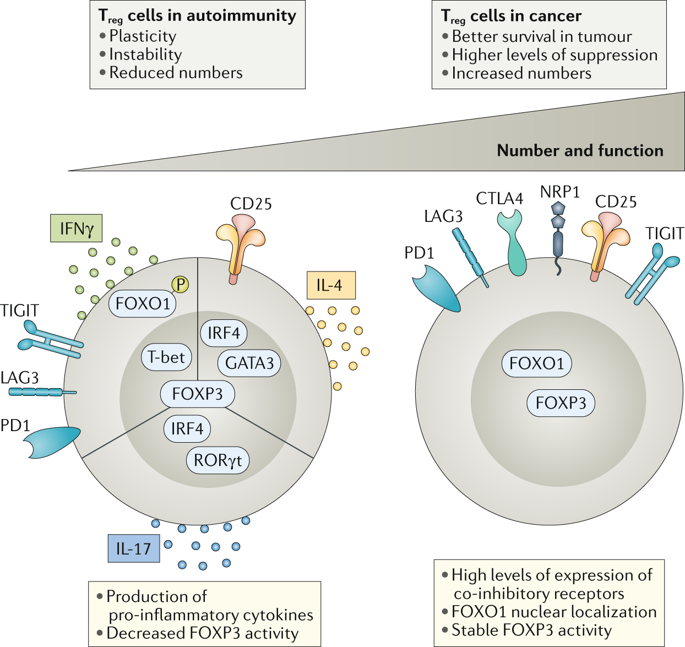Nature Reviews Immunology ( IF 67.7 ) Pub Date : 2020-04-08 , DOI: 10.1038/s41577-020-0296-3 Liliana E. Lucca , Margarita Dominguez-Villar

|
Regulatory T (Treg) cells constitute a dynamic population that is essential for controlling immune responses in health and disease. Defects in Treg cell function and decreases in Treg cell numbers have been observed in patients with autoimmunity and the opposite effects on Treg cells occur in cancer settings. Current research on new therapies for these diseases is focused on modulating Treg cell function to increase or decrease suppressive activity in autoimmunity and cancer, respectively. In this regard, several co-inhibitory receptors that are preferentially expressed by Treg cells under homeostatic conditions have recently been shown to control Treg cell function and stability in different disease settings. These receptors could be amenable to therapeutic targeting aimed at modulating Treg cell function and plasticity. This Review summarizes recent data regarding the role of co-inhibitory molecules in the control of Treg cell function and stability, with a focus on their roles and potential therapeutic use in autoimmunity and cancer.
中文翻译:

协同抑制受体对调节性T细胞功能和稳定性的调节
调节性T(T reg)细胞构成动态种群,对于控制健康和疾病中的免疫反应至关重要。在具有自身免疫性的患者中已观察到T reg细胞功能缺陷和T reg细胞数量减少,并且在癌症环境中对T reg细胞的作用相反。目前针对这些疾病的新疗法的研究集中于调节T reg细胞的功能,以分别增加或降低自身免疫和癌症的抑制活性。在这方面,最近显示了在稳态条件下由T reg细胞优先表达的几种共抑制受体可以控制T reg。在不同疾病环境中的细胞功能和稳定性。这些受体可以接受治疗性靶向,旨在调节T reg细胞的功能和可塑性。这篇综述总结了关于共抑制分子在控制T reg细胞功能和稳定性中的作用的最新数据,重点是它们在自身免疫和癌症中的作用和潜在的治疗用途。































 京公网安备 11010802027423号
京公网安备 11010802027423号